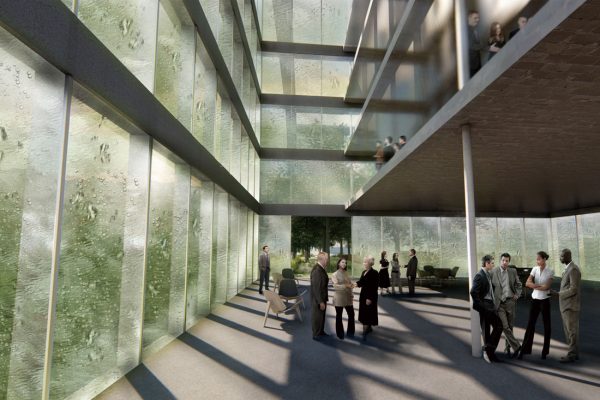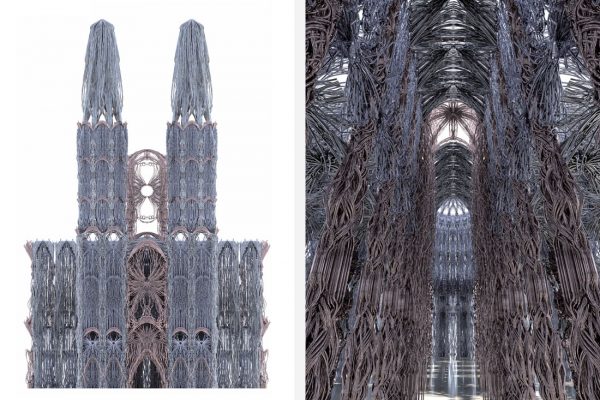How might we renegotiate the interfaces between people, buildings and their surroundings? Three design concepts from the Golden Pin 2018 awards cycle offer fresh perspectives.

Change View by Luo Shuzhen
September 7th, 2018
Things are heating up in Taiwan for the annual Golden Pin 2018 Concept Design Award. The 45 winners of Design Marks have just been announced after a judging session at the Taiwan Design Museum in Taipei. All of the winning design concepts are now in the running for one of three Best Design trophies and a cash prize. Final Selection judging will take place on September 21, and the Best Design winners will be announced at a ceremony on November 29.
This award for concepts sits under the umbrella of the Golden Pin award group, which was established to celebrate design created for the Chinese-speaking market. The basis of the Golden Pin program is that Chinese-speaking consumers demand products and designs tailored to their needs and desires – which can be extremely varied. Domestic and international companies selling products and undertaking design projects for this complex context must, says Golden Pin, couple an understanding of centuries of civilisation with a keen sense of local trends.
The Golden Pin Concept Design Award Design Mark winners are the top one per cent of entries, and they were submitted from Taiwan, China, South Korea and the UK. They are awarded in four categories: Product Design, Visual Communication Design, Packaging Design, and Spatial Design.
Judges this year have noted some trends in the entries. For example, Shu Chang Kung (President of the Chinese Society of Interior Designers) observes that spatial designers are increasingly highlighting the importance of building materials, production models, and the relationship of artificial structures with the environment. These considerations, he observes, are becoming more important than the design itself.
Meanwhile judges Keng-Ming Liu (Creative Director of Bito) and David Wang (Founder of bod design corp.) noted strong evidence of ‘localisation’ among the Design Mark winners – reflections of cultural phenomena in the designer’s local area, or evidence of concern for workers in the agriculture, forestry, fishery and farming industries.
Here we highlight three of the most intriguing Design Mark winners from the Golden Pin 2018 cycle:

In the Product Design category, Change View by Luo Shuzhen (Dongguan GAFA Cultures and Creativity Institute, China) throws typical modes of human observation into question. New perspectives are granted by this series of eyewear, which combines carefully positioned mirrors with a variety of goggle structures. The periscope-like goggles refract different viewing angles, apparently granting side, rear and elevated perspectives – an augmentation of the body’s normal capabilities and an analogue echo of the altered viewpoint that comes with augmented or virtual reality. What this could mean for the Instagram view of the world is anyone’s guess! Luo hopes Change View will inspire new methods of communication.

In the Spatial Design category, Build Fender by Chi-Shan Chen (Taiwan) is a concept for a building with a biological function. It was designed as a means of metabolising the damaging pollution caused by human activity – in particular the rapid advancement of industry. The building is a composition of cells, each of which has a role in the purification of the overall environment of the building. Cell walls control the entry and exit of materials, much like the cells of plants and fungi.

Autonomous Tectonic – Meta Matter by Chen Wei-Ting (Taiwan) was also successful in the Spatial Design category. It is a process of material production that generates form, gradually changing the output in response to the setting. Chen demonstrates it with the form of a gothic cathedral, but Meta Matter could take any form. Custom-designed 3D printing robots generate the output.
The Golden Pin Design Award Group is executed by the Taiwan Design Center and organised by the Industrial Development Bureau, Ministry of Economic Affairs, Taiwan. Images courtesy of Golden Pin 2018.
INDESIGN is on instagram
Follow @indesignlive
A searchable and comprehensive guide for specifying leading products and their suppliers
Keep up to date with the latest and greatest from our industry BFF's!

In this candid interview, the culinary mastermind behind Singapore’s Nouri and Appetite talks about food as an act of human connection that transcends borders and accolades, the crucial role of technology in preserving its unifying power, and finding a kindred spirit in Gaggenau’s reverence for tradition and relentless pursuit of innovation.

Within the intimate confines of compact living, where space is at a premium, efficiency is critical and dining out often trumps home cooking, Gaggenau’s 400 Series Culinary Drawer proves that limited space can, in fact, unlock unlimited culinary possibilities.

BLANCOCULINA-S II Sensor promotes water efficiency and reduces waste, representing a leap forward in faucet technology.

To honour Chef James Won’s appointment as Gaggenau’s first Malaysian Culinary Partner, we asked the gastronomic luminaire about parallels between Gaggenau’s ethos and his own practice, his multidimensional vision of Modern Malaysian – and how his early experiences of KFC’s accessible, bold flavours influenced his concept of fine dining.

Reinvigorating its local Angsila economy, this pavilion in Thailand becomes a floating restaurant where fishermen and visitors can select and eat their own oysters. No wonder it won The Influencer award at INDE.Awards!

It’s like looking into a giant eye: Laizhou Bar has been assembled using 6000 pieces of wood from discarded whisky barrels. The whole experience of this whisky bar has won it an INDE.Award in 2023.

The Victorian Heart Hospital by Conrad Gargett plus Wardle has won The Health and Wellbeing Space at the 2023 INDE.Awards. It sets a new design agenda where patient and staff wellbeing is central to function and form.

Sheeth Headquarters has just received a Workplace Design Commendation at the 2023 Australian Interior Design Awards. Read our INDESIGN Magazine exclusive on the Marrickville warehouse refurb that redefines the term ‘industrial-luxe’.
The internet never sleeps! Here's the stuff you might have missed

Jasmax merges with Melbourne’s Canvas Projects to expand in Australia, following its 2022 Sydney launch and targeting Victoria’s public sector.

Anker Bak raises the bar on healthcare furniture with his collection that has Design with Dignity at its core.

In this exclusive interview for the INDE.Awards SpeakingOut! Series we hear from Rowena Hockin, Studio Director of BAR Studio, as she discusses her journey into design, the philosophy behind BAR Studio’s work and the inspirations driving two of its recent standout projects: Capella Sydney and The Ritz-Carlton, Melbourne.